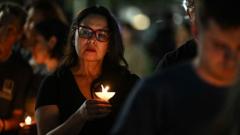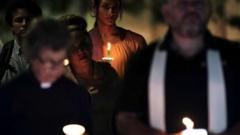The death toll from Monday's protests in Kenya has climbed to 31, prompting widespread condemnation and demands for accountability. The unrest, ignited by frustrations over police brutality and governance, has reignited fears over democracy in the country as calls for President Ruto's resignation intensify.
Rising Tension in Kenya Following Deadly Anti-Government Protests

Rising Tension in Kenya Following Deadly Anti-Government Protests
The recent surge in violence during anti-government protests in Kenya has sparked outrage, with human rights organizations calling for immediate justice.
The number of fatalities from Monday’s anti-government protests in Kenya has surged to 31, as reported by the Kenya National Commission on Human Rights (KHRCR), leading to public outrage and demands for justice. Initially, state authorities indicated that 11 individuals had lost their lives. In addition to the fatalities, over 100 people sustained injuries, and approximately 532 were reportedly detained during the protests, which spanned Nairobi and other significant urban areas.
The United Nations expressed deep concern regarding the excessive use of "lethal ammunition" by police against demonstrators. The KHRCR urged accountability for the spike in violence, condemning human rights violations from all parties involved. Many protesters gathered to commemorate Kenya’s pro-democracy struggles, only for their historical acknowledgment to devolve into chaos across 17 counties.
Alongside the protests, reports documented looting and destruction of properties, with a tragic incident involving a 12-year-old student reported to have been killed by a stray bullet while inside his home. This incident follows tensions that flared after the death of blogger Albert Ojwang while in police custody last month.
The UN's spokesperson for human rights expressed alarm over the continuation of violence, referencing earlier protests on 25 June that resulted in at least 19 deaths and significant property damage. Various civil society and religious organizations have called for an immediate and independent inquiry into the killings and subsequent arrests.
While Interior Minister Kipchumba Murkomen acknowledged the police's role in controlling the protests, opposition leaders have accused the administration of utilizing unmarked vehicles to transport armed individuals into opposition territories. They have called for a national boycott of businesses associated with President William Ruto’s administration, claiming the use of state-sponsored violence.
In this charged atmosphere, Kenya's Chief Justice Martha Koome warned that ongoing violent protests pose a risk to the nation’s democracy, highlighting the urgent need for dialogue and solutions. With over 140 lives lost this year in various protests, including last year’s anti-tax demonstrations, the country stands at a pivotal moment in its quest for justice and governance reform driven primarily by the younger generation.




















